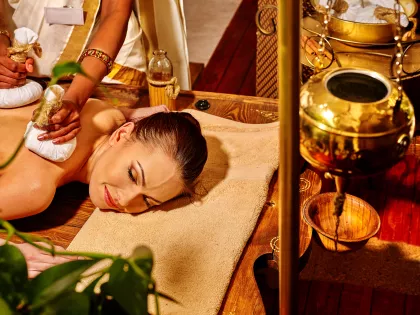What Are Essential Oils and What Are Their Benefits?
Essential oils have been used in Spa and Wellness businesses for decades, but actually they’ve been around longer than you might think. Essential oils first came to prominence in ancient Egypt, where they were used for religious purposes, and later for cosmetic and medical applications.
An essential oil is a concentrated extract from plants such as lavender, tea tree, or peppermint, while in Asia you will find ginger, lemongrass, or jasmine which are very popular among foreigners.
Since essential oils are known for their aroma, they are a vital component of aromatherapy - and there are a number of benefits that cannot be denied, especially when used as a form of stress reduction. Now we’d like to introduce some of the most popular essential oils and the benefits they provide that we think might come in handy when you are travelling, especially if you need an extra boost when you’re not feeling your best.
Lavender
Known as a multi-purpose essential oil, lavender essential oil is purported to treat anxiety, fight insomnia, and promote a good mood.
How to use it:
- Take a bath in lavender essential oil. A warm bath will calm your body and mind, so why not add 10 drops of lavender essential oil into a bath and soak in it for as long as you like.
- Or make your own mist spray. Take a sprayer and fill it three-quarters with water, then add 10-15 drops of lavender essential oil (or more if you like the smell to be strong, although we would suggest a mild, subtle scent). Then top up the final quarter with alcohol (Vodka or even Witch Hazel works too), shake well, and spray it on your linen.
Peppermint
If you have stomach issues, aching muscles, colds or congestion, or perhaps a general feeling of lethargy, turn to peppermint essential oil to combat those symptoms.
Peppermint contains menthol which works as a cooling agent so it can alleviate discomfort. Another benefit of peppermint is that it has antibacterial, antiviral, and anti-inflammatory properties.
How to use it:
- Prepare a bowl of hot water. Add a few drops of peppermint essential oil, then drape a towel over your head while positioning your face just above the bowl and inhaling the steam.
Lemongrass
No, we are not about to make tom yum, but one benefit of lemongrass itself is to help with the digestive system - so eating some cooked lemongrass or drinking lemongrass tea is good for you.
As for other benefits that you may find - because Lemongrass essential oil has antibacterial properties, antifungal properties, and antioxidant properties, lemongrass can help your body fight against free radicals and infections, while easing diarrhoea and relieving headaches or migraines.
How to use it:
- Dilute some lemongrass essential oil with water and use only a few drops on your wrists or on your handkerchief or a cotton ball then you can inhale when needed.
Patchouli
There are a lot of anti-aging agents found in patchouli essential oil but apart from the benefits it gives to your external appearance, on the inside patchouli can soothe internal inflammations and infections, and calm depression.
With its aroma, patchouli essential oil is often known as an aphrodisiac.
How to use it:
- Diffuse 3-4 drops of patchouli into your ambience to eliminate infectious bacteria.
- Use 2-3 drops of patchouli essential oil mixed with a carrier oil such as coconut oil or sweet almond oil, and massage on your body.
Tea Tree Oil
Used by native Australians for thousands of years, tea tree oil was first used via inhalation to treat coughs and colds, or by application directly to the skin to treat wounds and scars.
Tea tree oil contains a lot of antibacterial agents that are shown to kill bacteria, viruses, and fungi. This is why tea tree oil is suitable for fighting pimples, controlling dandruff, using it as a sanitizer, and treating nail fungus.
How to use it:
- Mix 1 part of tea tree oil with 3 parts of water, and apply it using cotton wool on pimples once or twice a day.
- To prevent your wounds and cuts from getting infected, or speed up the wound healing process, a few drops of tea tree oil can be added to a wound dressing. But never apply directly to an open cut.
Remember, essential oils are highly potent and even though some are safe to be applied topically, less is always more. Make sure you always dilute with carrier oil or water.



Share-
-
-
-